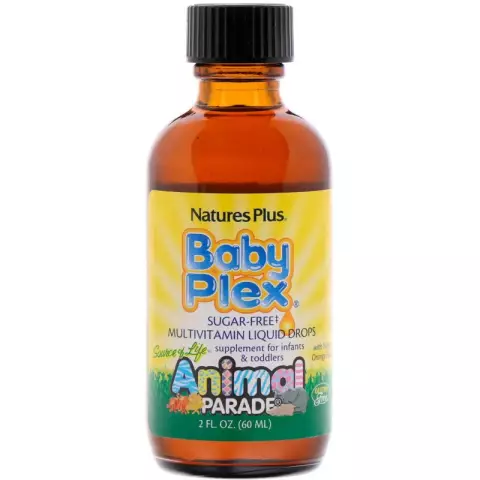- Author Rachel Wainwright wainwright@abchealthonline.com.
- Public 2023-12-15 07:39.
- Last modified 2025-11-02 20:14.
Vitamins for newborns
Many mothers are sure that in order for their baby to have good health, it is necessary to give him vitamins for newborns.

However, it is important not to overdo it here. The child's body, without a doubt, needs minerals and vitamins for full development and growth, but many mothers make the mistake of deliberately putting their children on various synthetic supplements. The child's body should grow on natural ingredients, not synthetic ones.
Eating breast milk or powdered milk formula, healthy babies, as a rule, have a balanced diet and do not need additional vitaminization, even for prevention purposes.
Vitamin D3 for newborns
Often, pediatricians prescribe vitamin D for newborns in order to prevent rickets. As a rule, doctors advise parents to start giving vitamin D3 to newborns as soon as possible. However, in fact, the appointment of vitamin D for newborns, however, like any other, should have good reasons.
So, most often, for children born in late spring and summer, to replenish the vitamin D deficiency, it is enough to take long walks in the fresh air so that the sun's rays fall on the body (but provided that the sun does not overheat the child, because everything is fine in moderation) … In this case, there is no need to take additional vitamin D for newborns.
But if the child was born in the winter season, and even has the first signs of rickets, vitamin D will not hurt. For each child, the required dose of vitamin D should be selected by a pediatrician, since an overdose of this vitamin causes hypervitaminosis. Typically, doctors prescribe this vitamin in the form of oil and water solutions.
However, all doctors agree that the safest way to get vitamins for newborns is breastfeeding. At the same time, a woman should ensure that she receives a balanced diet. It will not hurt to additionally take vitamin complexes intended for nursing women.
What other vitamins are prescribed for newborns?
If the child does not have any developmental abnormalities, then pediatricians do not prescribe any more vitamins for newborns.
With signs of anemia, doctors may prescribe the child to take iron-containing drugs, if there is a lack of weight - vitamin E for newborns, as well as ascorbic acid and vitamin A. However, all doctors strongly recommend not to self-medicate their children and in no case give them multivitamin complexes on their own. after all, excessive enthusiasm for taking vitamins for newborns can cause allergic reactions.
What vitamins for newborns should be present in breast milk?
At first glance, we can say that vitamins and minerals in human breast milk contain much less than in adapted milk formulas. However, the fact is that this composition of vitamins is more than enough for a newborn. In breast milk, all microelements and vitamins are associated with special proteins, which allows them to be absorbed almost 100% in the baby's body, while vitamins for newborns in milk formulas are absorbed much worse.
So, for example, in the composition of breast milk, a child absorbs about 70% of iron, while it absorbs only 10% from milk formula.
That is why, breastfed babies are more provided with all the necessary vitamins. But the mother herself may experience problems with vitamins, namely, she may experience fatigue, problems with teeth and skin, nails and hair. Therefore, a nursing woman should eat well.

So, the following vitamins and minerals should be present in breast milk:
- Vitamin A. This vitamin is especially necessary for a newborn in the case when he was born prematurely, he has problems with the intestines and a lack of weight. The diet of a lactating woman should contain animal products (butter, liver, yolk), as well as parsley and carrots;
- Vitamin E is necessary for newborns, as it participates in the metabolic processes of the body. The largest dose of vitamin E for newborns is found in colostrum;
- B vitamins. The main sources of B vitamins are animal products, so if a nursing woman is a vegetarian, she should think about taking additional B vitamins;
- Vitamin C for newborns also plays an important role. As a rule, there is enough of it in a woman's breast milk, but for prevention she needs to eat more vegetables and citrus fruits.
What vitamins for newborns should be in formula?
Any adapted milk formula that replaces breastfeeding for a baby must contain at least 11 minerals: sodium, iron, iodine, copper, phosphorus, zinc, manganese, potassium, calcium, magnesium, chlorides. There are also mixtures with additional content of chromium, fluorine, molybdenum, selenium.
There should be at least 15 vitamins for newborns in the adapted mixtures, among which are biotin, folic acid, vitamins A, K, C, D, B, E, inositol, choline, niacin. As a rule, doctors do not prescribe additional vitamins for children who are bottle-fed, including vitamin D3 for newborns.
However, artificial babies often lack ascorbic acid. To this end, doctors to fill the lack of vitamin C in newborns recommend to introduce orange and apple juices into the diet from 3-4 months of age.
Found a mistake in the text? Select it and press Ctrl + Enter.






